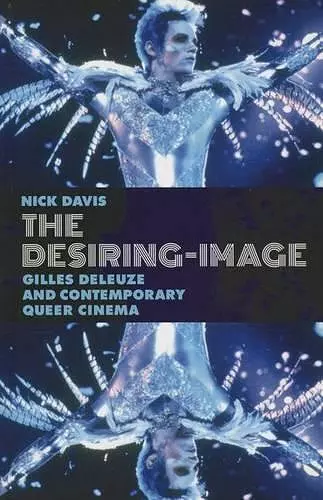The Desiring-Image
Gilles Deleuze and Contemporary Queer Cinema
Format:Hardback
Publisher:Oxford University Press Inc
Published:18th Jul '13
Currently unavailable, and unfortunately no date known when it will be back
This hardback is available in another edition too:
- Paperback£43.49(9780199993161)

The Desiring-Image yields new models of queer cinema produced since the late 1980s, based on close formal analysis of diverse films as well as innovative contributions to current film theory. The book defines "queer cinema" less as a specific genre or in terms of gay and lesbian identity, but more broadly as a kind of filmmaking that conveys sexual desire and orientation as potentially fluid within any individual's experience, and as forces that can therefore unite unlikely groups of people along new lines, socially, sexually, or politically. The films driving this analysis range from celebrated fixtures of the New Queer Cinema of the 1990s (including Cheryl Dunye's The Watermelon Woman and Todd Haynes's Velvet Goldmine) to sexually provocative films of the same era that are rarely classified as queer (David Cronenberg's Dead Ringers and Naked Lunch) to breakout films by 21st-century directors (Rodney Evans's Brother to Brother, John Cameron Mitchell's Shortbus). To frame these readings and to avoid heterosexist assumptions in other forms of film analysis, The Desiring-Image revisits the work of the philosopher Gilles Deleuze, whose two major works on cinema somehow never address the radical ideas about desire he expresses in other texts. This book brings those notions together in innovative ways, making them clear and accessible to newcomers and field specialists alike, with clear, illustrated examples drawn from a wide range of movies extending beyond the central case studies. Thus, The Desiring-Image speaks to readers interested in queer and gay/lesbian studies, in film theory, in feminist and sexuality scholarship, and in theory and philosophy, putting those discourses into rich, surprising conversations with popular cinema of the last 30 years.
The Desiring-Image is high concept: it adds a third term to 'movement-image' and 'time-image,' extending Deleuze's inquiry into present-day world cinema and making his pair of cinema books a trilogy. It is also high theory. Yet Davis's book is also concrete and accessible, explaining and synthesizing Deleuzian terminology and illuminating key works of New Queer Cinema in ways that renew their promise for critical inquiry, pedagogy, and film culture. The clarity of Davis's prose does not diminish the text's rhetorical performance, which is sustained and often dazzling. * Patricia White, author of Uninvited: Classical Hollywood Cinema and Lesbian Representability *
This is important and needed work. Davis' deeply original move is to fold Deleuze's film concepts into the Anti-Oedipus and to remap them, and in so doing to produce a distinctly original perspective for assessing and revaluing the films that inspire him. The Desiring-Image has renewed and extended Deleuze's concepts in ways that will encourage the formation of new perspectives and forms of analysis for cinema, queer or otherwise. * D.N. Rodowick, author of The Virtual Life of Film *
The Desiring-Image brings an exciting new perspective on film and desire. Impressive, at times startling in its groundbreaking originality, The Desiring-Image will stimulate anyone interested in how cinema produces the desire which shapes the worlds we inhabit. * David Martin-Jones, author of Deleuze and World Cinemas *
At its best, Nick Davis' The Desiring-Image thinks through Deleuze to explode our conception of the queer cinema canon, to challenge our understanding of homoeroticism, and to consider the ways queer cinema imagined itself in retrospect. This is an exhaustive yet lovingly written perverse intervention into film theory. * Lucas Hilderbrand, author of Inherent Vice: Bootleg Histories of Videotape and Copyright *
Seductive in its intellect and humbling in its prose, The Desiring-Image marks an important new entry into queer film studies and film theory more broadly. Queering Deleuze and 'deleuzing' queer film, Nick Davis' 'deterritorializing' treatise revives the radicalism and hope of both new queer cinema and the scholarship surrounding it. * Michele Aaron, editor of New Queer Cinema: A Critical Reader *
ISBN: 9780199993154
Dimensions: 160mm x 236mm x 23mm
Weight: 587g
332 pages